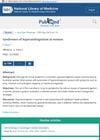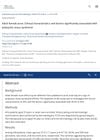 July 2022 in “International journal of medical science and clinical invention”
July 2022 in “International journal of medical science and clinical invention” Women with irregular periods should be checked for PCOS and treated early to prevent complications, with birth control pills helping to manage symptoms.
 26 citations,
November 2011 in “Arquivos Brasileiros De Endocrinologia E Metabologia”
26 citations,
November 2011 in “Arquivos Brasileiros De Endocrinologia E Metabologia” Diagnosing PCOS in teenagers should focus on signs of excess male hormones and not rely solely on ovarian ultrasound or irregular periods, and should be reassessed in adulthood.
 3 citations,
June 2023 in “European heart journal open”
3 citations,
June 2023 in “European heart journal open” Women with irregular periods have a higher risk of heart disease.
 2 citations,
May 1999 in “PubMed”
2 citations,
May 1999 in “PubMed” Hyperandrogenism in women can cause acne, hair growth, hair loss, irregular periods, and increase the risk of infertility and diabetes.
 1 citations,
November 2023
1 citations,
November 2023 PCOD mainly affects young women, causing symptoms like irregular periods and weight gain, with mixed success from lifestyle changes and medication.
 6 citations,
November 1997 in “International Journal of Dermatology”
6 citations,
November 1997 in “International Journal of Dermatology” Women with acne and irregular periods had higher active testosterone levels, which could suggest the usefulness of antiandrogen treatment.
 77 citations,
March 2004 in “Human Reproduction”
77 citations,
March 2004 in “Human Reproduction” Women with irregular periods and/or excessive body hair are more likely to have polycystic ovaries, and this condition is linked to higher health risks.
 38 citations,
May 2006 in “Archives of Gynecology and Obstetrics”
38 citations,
May 2006 in “Archives of Gynecology and Obstetrics” Women with only irregular periods or excess hair have a better hormone profile than those with full PCOS, but both groups are similar, indicating a need for better PCOS diagnosis methods.
1947 citations,
September 1995 in “New England journal of medicine/The New England journal of medicine” PCOS is a common hormonal disorder causing irregular periods and increased hair growth, linked to insulin resistance and long-term health issues.
 66 citations,
August 1999 in “The Journal of Clinical Endocrinology & Metabolism”
66 citations,
August 1999 in “The Journal of Clinical Endocrinology & Metabolism” Women with acromegaly often have irregular periods due to hormone imbalances and growth hormone effects.
 9 citations,
January 2022 in “Reproductive Biology and Endocrinology”
9 citations,
January 2022 in “Reproductive Biology and Endocrinology” High levels of male hormones and irregular periods best predict how well PCOS patients will respond to metformin treatment.
8 citations,
September 2005 in “Practical diabetes” PCOS is a condition causing irregular periods, excess male hormones, and infertility, often managed by targeting insulin resistance and specific symptoms.
5 citations,
January 2017 in “Dermato-endocrinology” Postmenopausal women with past hirsutism or irregular periods have more heart and lung diseases.
 December 2022 in “International Journal of Health Science”
December 2022 in “International Journal of Health Science” High levels of male hormones in women with PCOS can lead to fertility issues and symptoms like irregular periods, hair growth, acne, and hair loss; lifestyle changes are recommended for management.
 January 2015 in “International journal of reproduction, contraception, obstetrics and gynecology”
January 2015 in “International journal of reproduction, contraception, obstetrics and gynecology” Women with PCOS often have irregular periods, a higher chance of infertility and miscarriages, and may improve fertility with lifestyle changes and treatment.
 2 citations,
August 2021 in “Australasian Journal of Dermatology”
2 citations,
August 2021 in “Australasian Journal of Dermatology” Acne in adult women is often linked to polycystic ovary syndrome, especially in those who are younger, have premenstrual acne flare-ups, and irregular periods.
 December 2022 in “OBG Management”
December 2022 in “OBG Management” The conclusion is to diagnose PCOS with just hyperandrogenism and irregular periods, and treat with lifestyle changes and basic medications.

PCOS is a common hormonal disorder with symptoms like irregular periods and excess hair growth, managed with lifestyle changes and medications.
 November 2018 in “International Journal of Current Pharmaceutical Research”
November 2018 in “International Journal of Current Pharmaceutical Research” PCOS is a hormonal disorder causing symptoms like irregular periods and acne, and increases the risk of diabetes and heart disease.
 September 1997 in “Journal of the European Academy of Dermatology and Venereology”
September 1997 in “Journal of the European Academy of Dermatology and Venereology” Hirsute women with ovarian-sourced hirsutism are more likely to have irregular periods, with higher BMI and altered hormone ratios.
 January 2001 in “Cambridge University Press eBooks”
January 2001 in “Cambridge University Press eBooks” Early signs of PCOS in girls, like irregular periods and polycystic ovaries, suggest a need for early diagnosis and intervention to prevent further health issues.
9 citations,
February 2007 in “JAMA” PCOS is a common inherited condition causing cysts, irregular periods, and increased diabetes risk in women.
 135 citations,
August 1994 in “Clinical Endocrinology”
135 citations,
August 1994 in “Clinical Endocrinology” Most women with hirsutism or androgenic alopecia had polycystic ovaries, especially if they had irregular periods.
 45 citations,
January 2006 in “Endocrine journal”
45 citations,
January 2006 in “Endocrine journal” To diagnose Polycystic Ovarian Syndrome, two out of three signs—irregular periods, high male hormone levels, or cysts on the ovaries—are needed.
 2 citations,
January 1970 in “Asian journal of pharmaceutical research and development”
2 citations,
January 1970 in “Asian journal of pharmaceutical research and development” PCOS is a hormonal disorder affecting many women, leading to symptoms like acne and irregular periods, and increasing the risk of diabetes and heart disease.
 December 2022 in “International journal of preventive, curative & community medicine”
December 2022 in “International journal of preventive, curative & community medicine” PCOS is a common hormonal disorder in women, causing symptoms like acne and irregular periods, and is managed with medication and lifestyle changes.
 December 2022 in “International Journal of Current Science Research and Review”
December 2022 in “International Journal of Current Science Research and Review” Polycystic Ovary Syndrome (PCOS) is a common but often undiagnosed disorder in women that can cause irregular periods, infertility, and other symptoms, and can be managed with lifestyle changes, medication, and sometimes surgery.

Many young women have Polycystic Ovarian Syndrome (PCOS), which is often linked with irregular periods, depression, low self-esteem, and insomnia. Lifestyle and diet changes, along with regular counseling, can help manage these symptoms.
 October 2010 in “Reproductive Biomedicine Online”
October 2010 in “Reproductive Biomedicine Online” Women with pituitary adenomas often have reproductive issues, like irregular periods and trouble getting pregnant, but not always breast milk production without pregnancy.
 13 citations,
January 2012 in “International Journal of Trichology”
13 citations,
January 2012 in “International Journal of Trichology” Most hirsutism patients had idiopathic hirsutism or PCOS, with hormonal imbalances and signs like acne and irregular periods.


























